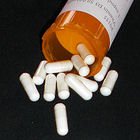
A new way of detecting substandard drugs will be put to field tests soon
Flickr/AnoLobb@healthyrx
A microchip tailored to detect a specific active ingredient in a drug that costs only a few US cents to produce could help in efforts to detect counterfeit and substandard medicines in the developing world, researchers say.
The replaceable microchip comes in a portable, shoebox-sized device, known as 'PharmaCheck'. It is equipped with a fluorescent probe that binds to an active ingredient in a drug sample and the strength of its glow indicates the quality and quantity of a specific ingredient inside a drug.
"It is like a light bulb being switched on or increasing in brightness, and this can be measured by something as simple as an iPhone," said Muhammad Zaman, an associate professor of biomedical engineering at Boston University, United States, and head of the team behind the chip. It is expected to complete field trials over the next two years and to cost 20 per cent less than existing technologies for detecting substandard drugs.
Zaman said the new approach is better than a one-size-fits-all strategy, because the probes for each type of drug are more accurate, sensitive and reliable, and chips have multiple channels for testing different ingredients. For example, they could be used to test combination therapies common in the treatment of malaria.
It is also possible to repeat tests and confirm results in the field, without sending results to a well-equipped laboratory, which may be far from rural communities.
Unlike existing 'lab in a van' technologies, the probe can measure both how a drug binds to the probe — to ensure it is not toxic or inactive — as well as the concentration of the active ingredient.
In many developing countries, legitimate medicines may become substandard due to manufacturing failure, poor storage facilities, exposure to sunlight or degradation, Zaman said.
Boston University is working on the new product in collaboration with the US government-funded 'Promoting the Quality of Medicines (PQM)' programme, which provides technical assistance to developing countries to ensure the safety of drugs, and is implemented by the US Pharmacopeial Convention (USP).
"We want to take the current technology to the next level," said Kennedy Chibwe, a senior programme advisor at USP. "At the moment we only get qualitative data on drug quality; we don't know the exact amount of drug in the medicines."
From the project's outset, the PharmaCheck team has ensured that the technology was suitable to implementation in the developing world, in relation to cost, access, mobility and available infrastructure, said Zaman. "Most competing technologies fail on one or more of these parameters."
But Zaman cautioned that "the limitation is not with the technology — as this works — but the issues at point-of-use, such as how much training is required and how fragile the chip might be".
Jamie Barras, a research fellow at King's College London, agreed that the training of practitioners will be integral to ensuring a sample is prepared according to strict protocols, to ensure reliability.*
*This article was ammended on 14 August to remove a comment by one of the commentators upon his request.
Rachel Mundy
scidev.net










No hay comentarios:
Publicar un comentario